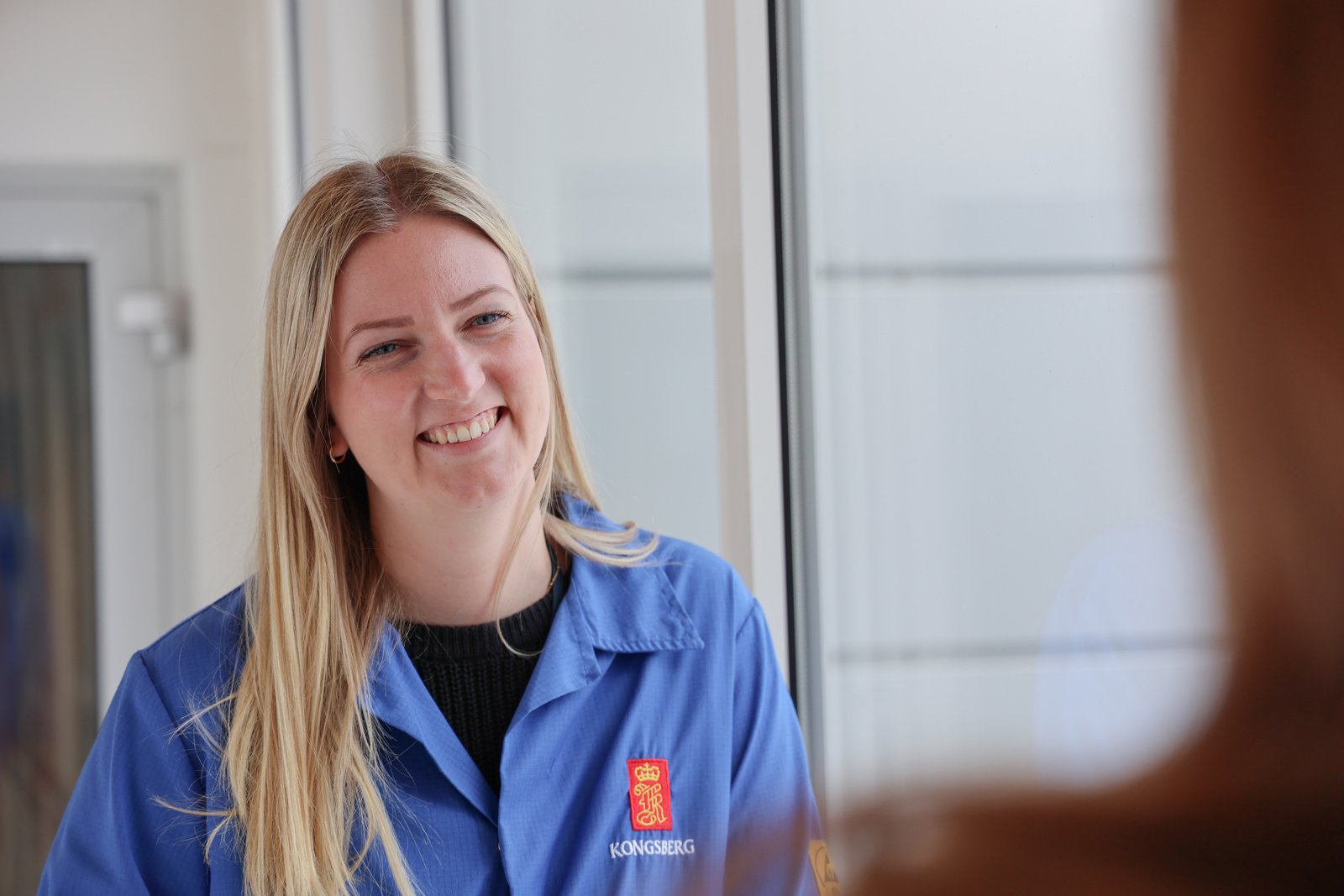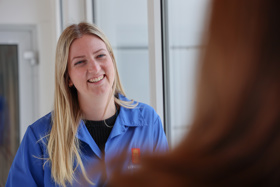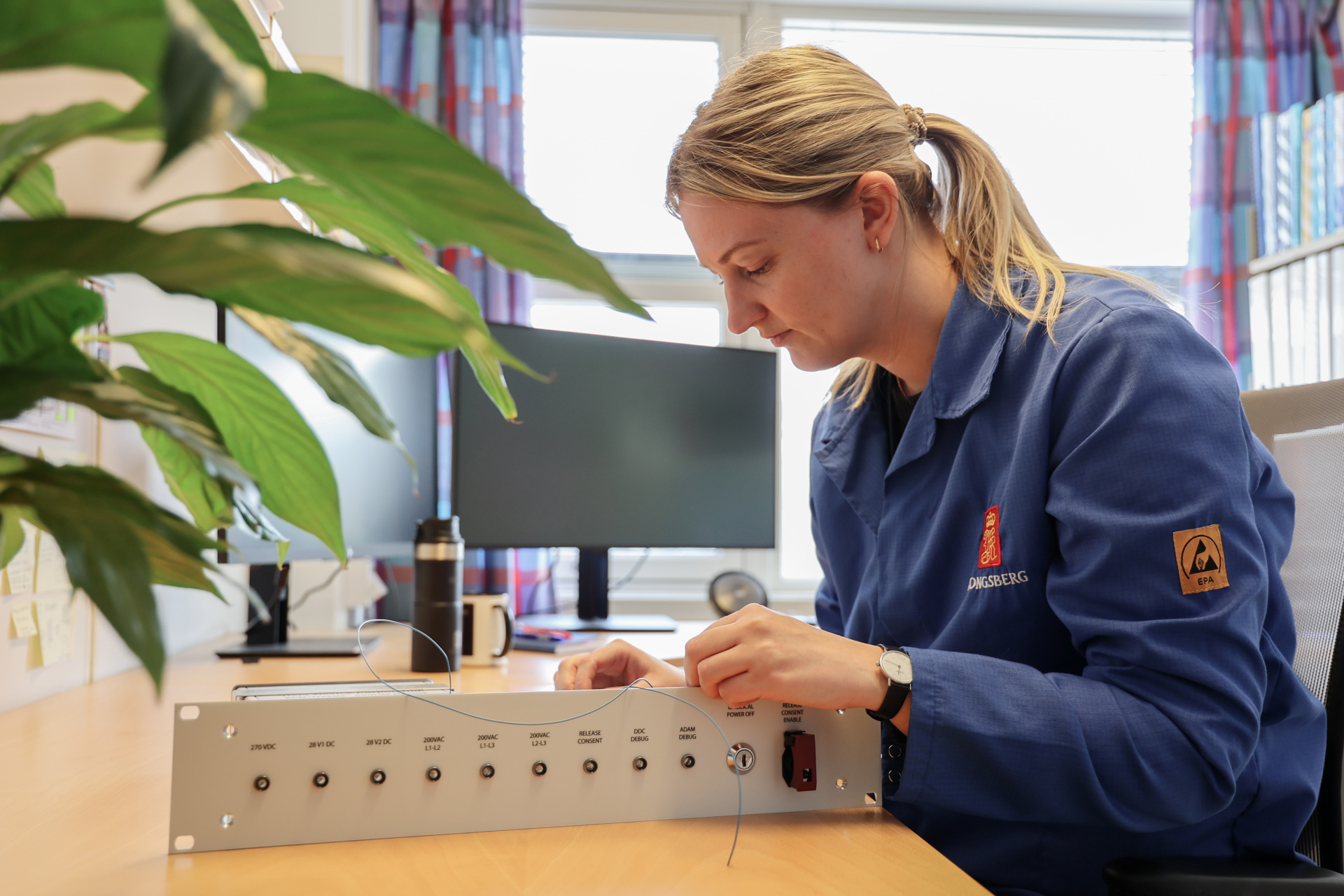
Seeing the Big Picture
With a Master's degree in Systems Engineering and specialization within industrial economics, Ingeborg has made herself attractive in the job market. Fortunately, Kongsberg Defence & Aerospace (KONGSBERG) was her first choice.
-
Text:Anita Nyheim/ KONGSBERG
Photo:Helene Strøm Bergset/ KONGSBERG
The 29-year-old was born and raised in Kongsberg, but has lived outside the city during studies. She has always planned to move back home when the time was right, and now she is finally back in the city of her heart, with her boyfriend and a Cocker spaniel puppy on the load.
For the past two years, she has worked as a systems engineer and technical lead at Kongsberg Defence & Aerospace.
“I love having a lot of different tasks and to know a little about a lot, instead of a lot about a narrow subject area. And that is one of the reasons why I chose Systems Engineering - precisely because it is a broad field where you are responsible for keeping order in the chaos. I really enjoy that.”
Industrial Master’s degree – a golden opportunity
With a fairly narrow and specific Bachelor's degree in underwater technology from the University of Bergen, Ingeborg wanted a broader and more applicable Master's degree, which would give her a greater scope for work opportunities.
The combination of heavy technical expertise and broad methodological system knowledge, in addition to specialization in industrial economics, proved beneficial and not least relevant to the job she has today. Industrial economics is a subject that combines technology, economics and administration.

“The study program suited me very well. We had assembly-based teaching where in each subject we had one week of intensive teaching, followed by ten weeks of project work. It gave more room to manage everyday life and was a very good form of learning,”
Many of the system engineers she works with are recruited through the Industrial Master's course. The most common is probably the 50/50 variant, where you study and work in a relevant industrial company at least half of the time.
But Ingeborg was a full-time student and really enjoyed it. She particularly liked the combination of engineering and economic subjects, and project collaboration across the two student groups. She loves travelling, and took advantage of the opportunity for an exchange semester at the University of Technology in Sydney, Australia.
The department she works in consists of both newbies and seniors, a well-functioning combination. Ingeborg absorbs learning from the knowledgeable seniors. Many of the "heavy" seniors are highly capable software developers, and have built their system expertise through experience. Several of these choose to build on formal competence within Systems Engineering by choosing individual subjects that are relevant to their job.
Master’s of Science in Systems Engineering
Industrial Master in Systems Engineering is a study offered at the University of Southeast Norway (USN), campus Kongsberg. It has been developed in close collaboration with the technology companies in the city to meet the industry's future competence needs.
The Industrial Master's gives students a mix of engineering, technology and management training, and they will be qualified to participate in and lead the development of large, complex systems that require the involvement of many disciplines. Systems Engineering is the ultimate tool for creating competitive products, systems and services.
The degree is highly sought after in many industries, and provides a unique opportunity to work in a high-tech company with salary, while studying. In this way, one can grow into the role of engineer and prepare to meet the industry's need for efficiency and new working methods.
USN collaborates with companies across large parts of Norway, which provides a flexible arrangement for those who wish to live elsewhere in the country and at the same time take their master's degree.
The application deadline for the study is mid-March, and places fill up quickly.

Trust and responsibility
The project she is currently working on is in the industrialization phase, which means that they are developing a new production system to prepare a product for serial production. Ingeborg has many different tasks, and her organizational skills come in handy.
She works both as a system engineer and system architect, and is responsible for both finance and administrative tasks in the project. She is also technical manager, or what is internally called "job package manager" for the systems group and the hardware group, where she is responsible for teams that can consist of anything from 10 to 20 people. She was trusted with this responsibility after just a few months.
“Although it was a bit scary to be thrown into it, I feel enormous trust and that they have faith in me, and that is a very good feeling,” she says carefully.
But modesty notwithstanding – the girl has proven that she can and that she wants to, thus the opportunities come. Now she has been nominated as a candidate for the group's leadership program "Leadership essentials" in order to further develop her leadership skills. That is impressive after only working a couple of years in the company.
Although she greatly appreciates the trust, and enjoys both to lead and being led, it is important for her to keep her technical competence up to date. Therefore, she uses the opportunity to take some practical courses, to ensure that she can also participate in the production technical work and keep the understanding of the subject.
“I believe that the system engineer's role should have been implemented to a greater extent in all companies, because it will ensure fewer design changes late in the development process,”
No day is the same
A working day can consist of many different tasks and you rarely find Ingeborg in her office for an entire day. She can be in the lab making prototypes, soldering, crimping and checking that things work, or sitting in front of the screen, modelling and creating system designs, or participating in meetings with subcontractors and reviewing requirement documentation and production documents.
In the management role, she coordinates meetings, works on budgeting, reporting and follow-up of the project, and sometimes she supporting the production.
“I have a lot of contact and interaction with colleagues from various disciplines, and often meet new people every day. In my role, it is therefore important that you enjoy collaboration and the people around you, but you can also take part in shaping your own working day,” she says.
Although she hopes that the products they make never will come to use, she finds peace in knowing that this is high-tech and world-class, with precision and safety as the leading factors.


